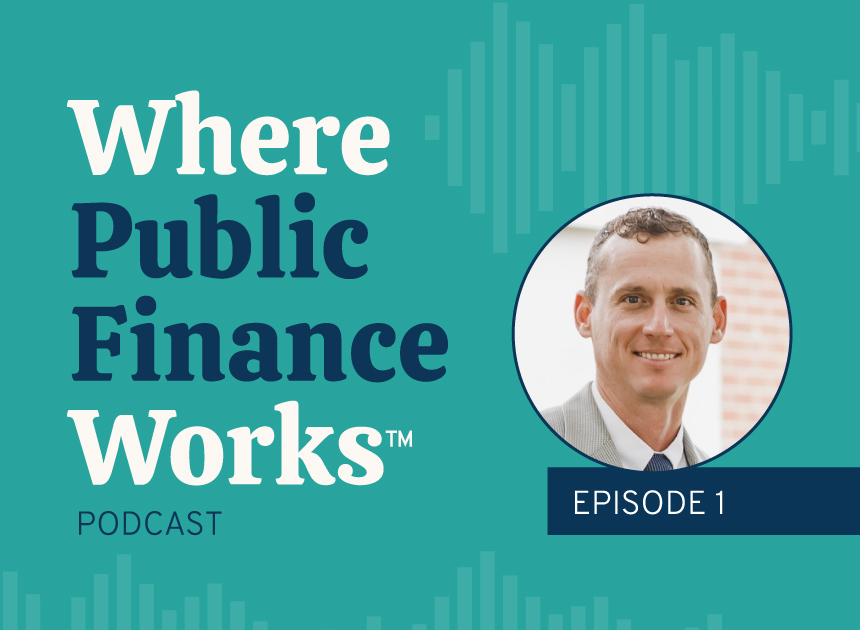Episode Summary
In this episode of Where Public Finance Works, we unravel the unseen world of public finance through the compelling journey of Lee Plunkett, Assistant CFO at Forsyth County in North Carolina. Discover the diverse path our guest has taken in his finance career, as Lee shares his unique story–from the Illinois Department of Corrections to a stint in retail banking, and a pivotal role in the Governor’s Office. Lee takes you into the strategic financial management practices of Forsyth County, exploring detailed approaches to debt financing, the significance of two-thirds bonds, and crucial decisions in the realm of investments.
Join our host, Tyler Traudt, as he uncovers the challenges faced by public finance teams, including staff turnover and the impending retirement cliff, while highlighting the rewarding role of delivering essential services and progress to communities.
Lee’s insights, from his excitement for budgets to the creation of a centralized grants program, offer a behind-the-scenes look into the often-unseen world of public finance.
Featured Guest
.png?width=200&height=200&name=Lee%20Plunkett%20Assistant%20CFO%20Forsyth%20County%2c%20NC%20(2).png) Lee Plunkett is the Assistant CFO for Forsyth County in North Carolina. He began his tenure with the County as a Budget and Management Analyst and then transitioned to Treasurer before serving in his current role. Lee oversees the treasury, debt, and payroll operations of the County.
Lee Plunkett is the Assistant CFO for Forsyth County in North Carolina. He began his tenure with the County as a Budget and Management Analyst and then transitioned to Treasurer before serving in his current role. Lee oversees the treasury, debt, and payroll operations of the County.
His public sector experience began in 2005 when he started the Master of Public Administration program at the University of Illinois Springfield and took an internship with the Illinois Department of Corrections. After the internship, Lee worked as a Budget Analyst for the Illinois Governor’s Office of Management and Budget before heading to North Carolina.
Lee lives in Winston-Salem with his wife, Whitney, and three children. When not in the office, Lee enjoys spending time with his family, playing golf and basketball, and creating furniture in his woodshop.
Top Takeaways From Episode One
- The path through public finance is often diverse: Lee’s unique story highlights the diverse paths individuals often take in public finance. From the Illinois Department of Corrections, two jobs in retail banking, the Governor’s Office, and working as a Treasurer, his journey emphasizes the value of gaining experience across different sectors within public finance.
- Creativity and analytic thinking lead to strategic financial management: Lee shares the valuable insights gained through the strategic financial management practices employed by Forsyth County. This includes their detailed approach to debt financing, the use of two-thirds bonds for education funding, and the important decisions involved when it comes to investments.
- A centralized grant program is built across all departments: The journey from decentralized grant management to a centralized grant program was driven by Forsyth County’s need to efficiently handle a significant influx of funds. With the help of UNC’s School of Government, establishing compliance structures and forming a steering committee were pivotal steps, with the ultimate goal of creating a structured support system for all departments to navigate and monitor the grant process effectively.
Public Finance Insights
[4:37] Excitement for budgets leads to a job with the Governor’s Office: While at the University of Illinois, Lee’s enthusiasm for numbers, especially budgeting, gives him a connection that jumpstarts his career in public finance— a job as a Budget Analyst with the Illinois Governor’s Office.
[6:03] A new move and new position as Budget Analyst in Forsyth County: When Lee’s wife lands an out-of-state residency, he struggles to find another analyst position. To pay the bills, he becomes a retail banker. However, a chance encounter opens new opportunities.
[11:38] Fascination with the debt side of budgets leads to a treasury position: When a Treasurer position becomes available, Lee is encouraged to apply. “I was intimidated. Especially, making my first multi-million-dollar investment purchase. It was crazy for me at the time, but I loved it.”
[13:44] Uncovering functions of the county treasury: Lee expands his expertise in debt, investments, payroll, and grants. Now as the new Treasury and Deputy CFO, Lee takes over the debt side of budgeting and discovers this is his favorite area of finance.
[20:02] Taking a ladder/cashflow forecast horizon approach to investing and debt service payments: Lee discusses adopting the right approach to investing, carefully managing debt service payments, payroll, and overall liquidity, aiming to minimize risks and optimize earnings.
[23:02] Talking the debt side of the equation: Details on the county’s approach to debt and what they call The Main Three: general obligation debt, two-thirds general obligation debt, and limited obligation debt. The North Carolina Local Government Commission is helpful with keeping the county target.
[24:39] Funding education with high capital maintenance: Lee talks about why the bulk of the county’s debt obligations are tied to schools and community colleges.
[26:35] Defining two-thirds bonds: Lee defines two-thirds bonds and how valuable they can be when trying to fund community projects such as the maintenance of libraries and schools.
[28:35] Creating a centralized grant program: After receiving 75 million dollars in grants, Lee and the team realize they need to build a centralized grant program that all departments can use.
[32:56] Managing disbursement: Lee discusses how local governments manage the monitoring and compliance of immense dollars.
[35:06] Biggest priorities for the county: After a brutal three-year stretch installing a new ERP system, Lee discusses keeping experienced employees from leaving, especially as turnover challenges in public financing increase.
[41:03] The Stewards of Public Money: Lee speaks on the outcomes of working in public financing, building trust in your community, and improving the lives of everyone around you.
Subscribe to Where Public Finance Works Podcast







.jpg)
.jpg)
.jpg)
